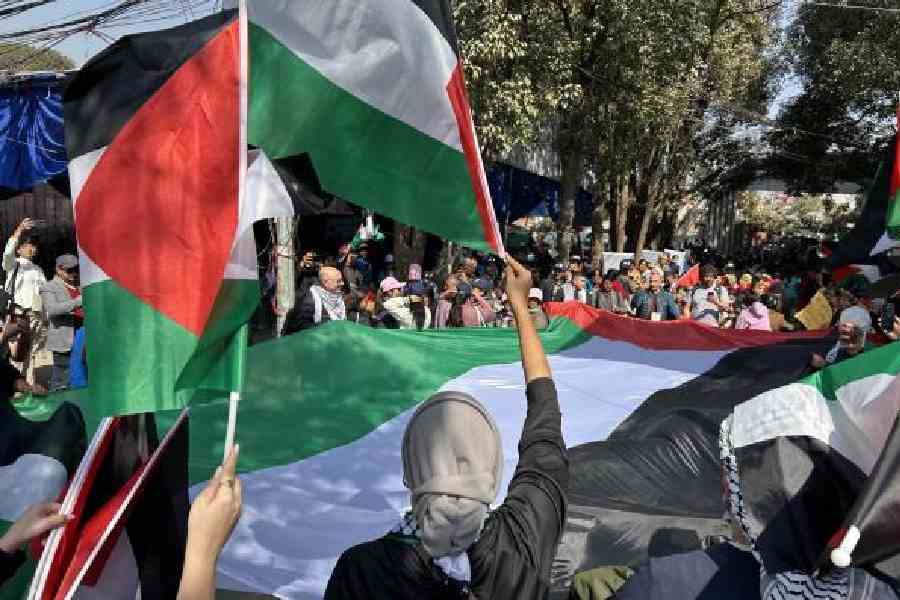Odeh Zahran has come to Nepal with hope. The founder of Afkar — an NGO from Ramallah, Palestine — is confident that more awareness about the plight of the people in the Gaza Strip and the West Bank will lead to more pressure on the Benjamin Netanyahu government, forcing Israel to announce a ceasefire.
“More than 28,000 people have been killed, Nearly 70,000 people have been injured since October 7 when Israel launched this war on Palestine.... Over one million people have been displaced,” said Zahran within hours of the Israeli military launching a new wave of air strikes and artillery fire in southern Gaza Strip, forcing Palestinians to flee overcrowded Rafah.
“We want to let the world know about the humanitarian crisis in our motherland and that’s why we are here... There has to be a ceasefire now,” the middle-aged man from Ramallah, central West Bank, told The Telegraph on Thursday as “Free, free Palestine”, “From the river to the sea, Palestine will be free” slogans filled the air at Bhrikuti Mandap in the Nepali capital.
As the 16th edition of the World Social Forum (WSF) kicked off here with a colourful march in Kathmandu, the Palestinian tri-colour — with three equal horizontal stripes in black, white, and green from top to bottom overlaid by a red triangle on the hoist — were in the hands of scores of people from different countries like Morocco, Tunisia, Syria, Turkey, Canada, France, Nepal, Pakistan, Bangladesh and India as they expressed solidarity with Palestine.
On Day One of the WSF 2024 — held under the theme “Another World is Possible” — freedom for Palestine and the immediate ceasefire in Gaza emerged as the major demands. The other topics at the summit were food and healthcare security, gender and justice and for all. The forum is attended by 40,000 people from 92 countries.
“From the very beginning of WSF, the Palestinian cause has always been part of the agenda... The focus is more this time because of the ongoing war. Every day, there is a massacre… This cannot go on. We want support from the world community and that’s why we are here,” said Zahran who represents the Palestinian NGO Network (PNGO), an umbrella organisation comprising 133 member outfits working in different developmental fields.
According to Zahran, the journey from Ramallah to Kathmandu was not easy as he had to reach Jordan — after negotiating rounds of checks by Israeli forces along the way — to take a flight to Dubai and then to Kathmandu.
“You don’t know the humiliation in the journey from Ramallah to Jordan through Jericho, a historical city known as the earliest settlement in the world... People around the world need to know what’s happening in our part of the globe and the WSF is possibly the best platform to create awareness about our plight,” he added.
The WSF began its journey in 2001 as an alternative to the World Economic Forum — held annually in Davos, Switzerland — amid questions on how much value the annual summit of the rich and the powerful generates for the global community. From the first edition of the summit — which was held in Porto Alegre, Brazil — the forum has been serving as a vital platform for open and horizontal exchange among civil society organisations, social movements, trade unions and individuals opposing the neo-liberal policies and globalisation.
After the solidarity march along the roads of Kathmandu, the inaugural programme at Bhrikuti Mandap included speeches, cultural shows and thematic discussions on a variety of issues.
Several key issues relevant for India — like the developments in Manipur and the rights of SCs, STs — will also come up for discussion over the next three days at WSF 2024. The summit is being held for the first time in Kathmandu and created an unprecedented level of excitement among youths in Nepal which is witnessing both economic and political instability.
“The event in Nepal is an opportunity to showcase the struggles and democratic aspirations of the country. In a global landscape where authoritarianism is on the rise and civic space is shrinking, Nepal stands as a beacon for the democratic articulation of people’s voices,” Amitabh Behar, executive director (interim), Oxfam International, told The Telegraph.
According to Behar, the event is not just about discussions and ideals, it is also about translating inspiration into action.
Several participants at the event — like Aurelie, a teenage student from Montreal who was waving the Palestinian tricolour — told this correspondent that she came to the WSF with her five friends to understand the key challenges facing the world and draw lessons and inspiration from the activists taking part in the event.
“Look at the bandwidth here... Some are talking about freedom for Palestine while others are explaining the need to protect labour rights. You see people here coming to discuss an entire gamut of issues, ranging from climate change to gender justice. The hope that Another World is Possible is so palpable here,” said Jami Chandio, a Pakistani scholar, writer and activist.
“At least we can pass on this hope to our next generations,” summed up the executive director of the Centre for Peace and Civil Society, a think tank based in Pakistan’s Sindh province.










